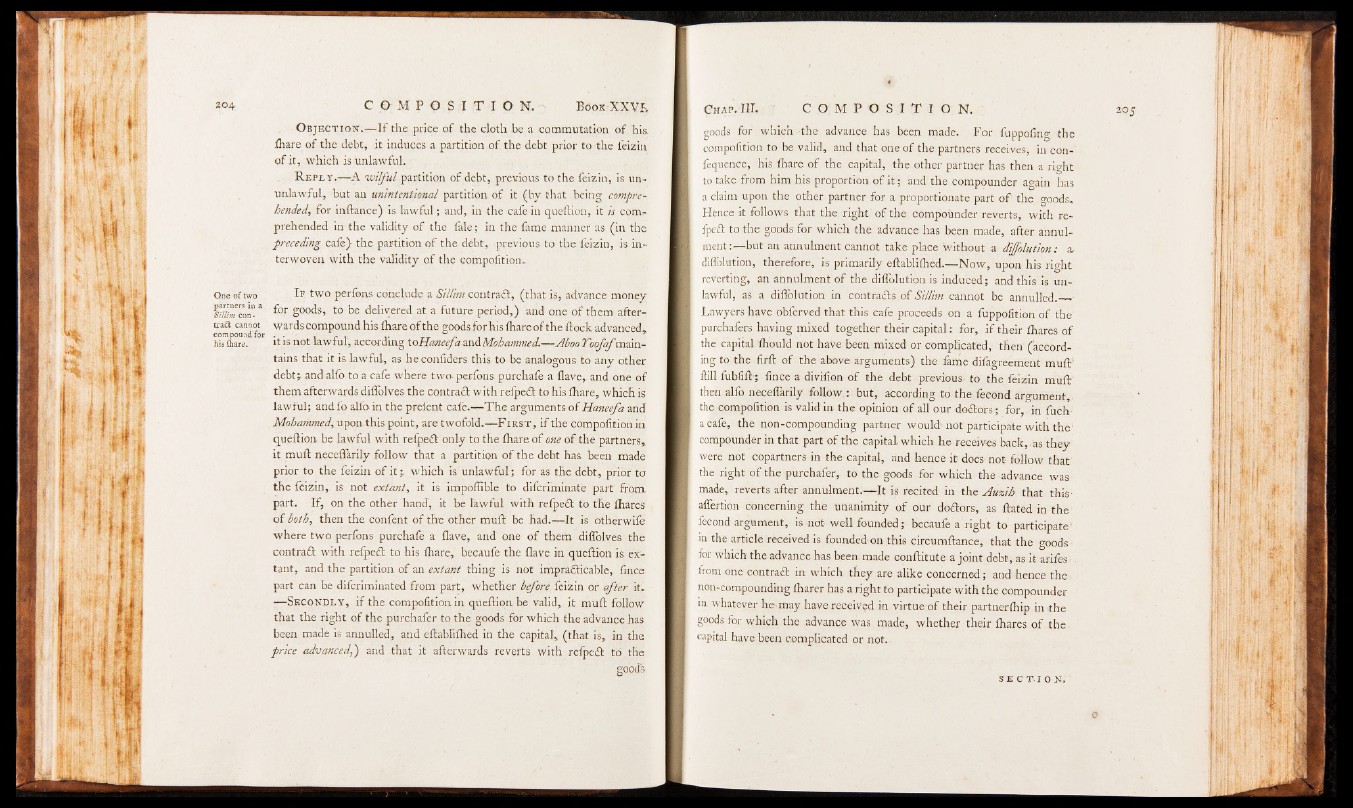
204 C O M P O S I T I O N.
O n e o f tw o
p a r tn e r s in a
S illim c o n t
r a i l c an n o t
c om p o u n d fo r
h is ih a r e .
B o o sX X V K
O b j e c t i o n .— If the price of the cloth be a commutation of his.
Ihare of the debt, it induces a partition of the debt prior to the ieiziii
of it, which is unlawful.
R e p l y .— A wilful partition of debt, previous to the feizin, is un-
unlawful, but an unintentional partition of it (by that being comprehended,
for inftance) is lawful; and, in the cafe in queftion, it is corn-
prehended in the validity of the fale; in the fame manner as (in the
preceding cafe} the partition of the debt, previous to the feizin, is inr-
terwoven with the validity of the compofition.
If two perfons conclude a Sillim contrail, (that is, advance money
for goods, to be delivered at a future period,) and one of them after-
wards compound his Ihare of the goods for his Ihare of the Hock advanced,
it is not lawful, according toHaneefa zn&Mohammed.— Aboo Toofaf maintains
that it is lawful, as he confiders this, to be analogous to any other
debti and alfo to a cafe where two perfons. purchafe a Have, and owe of
them afterwards dilfolves the contrail with refpedt to his Ihare, which is
lawful; and fo alfa in the prefent cafe.— The arguments of Haneefa and
Mohammed, upon this point, are twofold.— F i r s t , if the compofition in
queftion be lawful with refpeil only to the Ihare of one of the partners,
it muft neceflarily follow that a partition of the debt has been made
prior to the feizin of i t ;. which is unlawful; for as the debt, prior to
the leizin, Is not extant, it is impoffible to difcriminafe part' from
part. If, on the other hand, it be lawful with refpeil fo the Ihares
of both, then the confent of the other muft be had.— It is otherwife
where two perfons purchafe a Have, and one of them diflolves the
contrail with refpeil to his Ihare, becaufe the Have in queftion is extant,
and the partition of an extant thing is not impracticable, lince
part can be dilcriminated from part, whether before feizin or after it,
— S e c o n d l y , if the compolition in queftion he valid, it muft follow
that the right of the purchafer to the goods for which the advance has
been made is annulled, and eftablilhed in the capital, (that is, in the
price advanced,) and that it afterwards reverts with refpedl to the
goods
C h a p . III. C O M P O S I T I O N . 20 5
goods for which the advance has been made. For fuppoling the
compofition to be. valid, and that one of the partners receives, in con-
fequence, his Ihare of the capital, the other partner has then a right
to take from him his proportion of it; and the compounder again has
a claim upon the other partner for a proportionate part o f the goods.
Hence it follows that the, right of the compounder reverts, with re-
fpedt to the goods for which the advance has been made, after annulment
:— but an annulment cannot take place .without a diffolution: a-
diffolution, therefore, is primarily eftablilhed.— Now, upon his rio-ht
reverting, an annulment of the diffolution is induced; and this is unlawful,
as a diflolution in contradts.of Sillim cannot be annulled._
Lawyers have obferved that this cafe proceeds on a fuppofition of the'
purchafers having mixed together their capital; for, i f their Ihares of
the capital Ihould not have been mixed or complicated, then (according
to the firft of the above arguments) the fame difagreement muft'
ftill fubfift; lince a divifion of the debt previous- to the feizin muft
then alfo neceflarily follow : but, according to the fecond aro-ument,.
the compofition is valid in the opinion o f all our doctors ; for, in fiich-
a cafe, the non-compounding partner would not participate with the1
compounder in that part of the capital which he receives back,.as they
were not copartners in the capital, and hence it does not- follow that
the right of the purchafer, to the goods for which the advance was
made, reverts after annulment.— It is recited in the Auzih that this
affertion concerning the unanimity of our doctors, as ftated in the
fecond argument, is not- well founded; becaufe a right to participate'
in the article received is founded on this circumftance, that the °-oods-
for which the advance has been, made conftitute. a joint debt, as it arifes .
from one contract in which they are alike concerned; and hence the ■
non-compounding Iharer has a right to participate with the compounder '
m. whatever he-may have received in virtue of their partnerlhip in the
goods for which the advance was made, whether their Ihares of the
capital have been complicated or not. •
S E C T I O N .